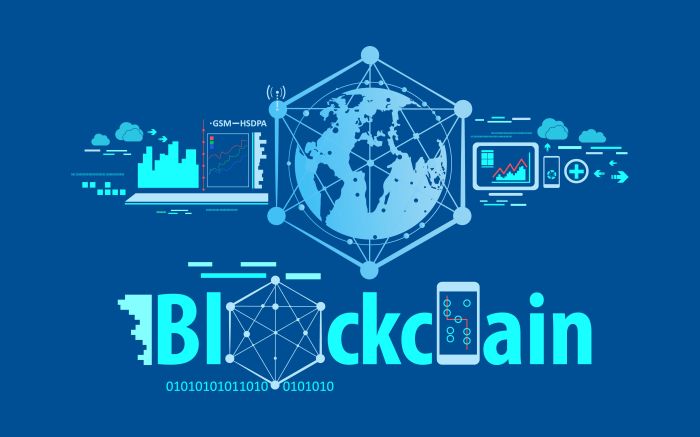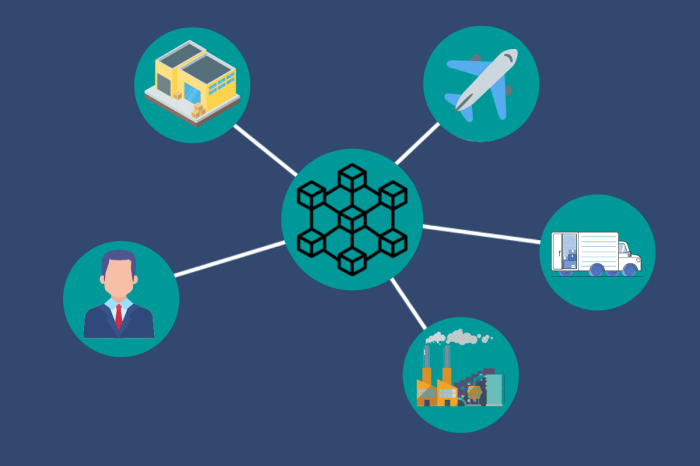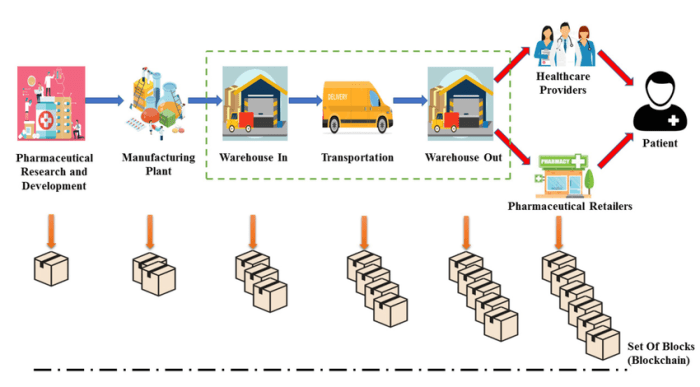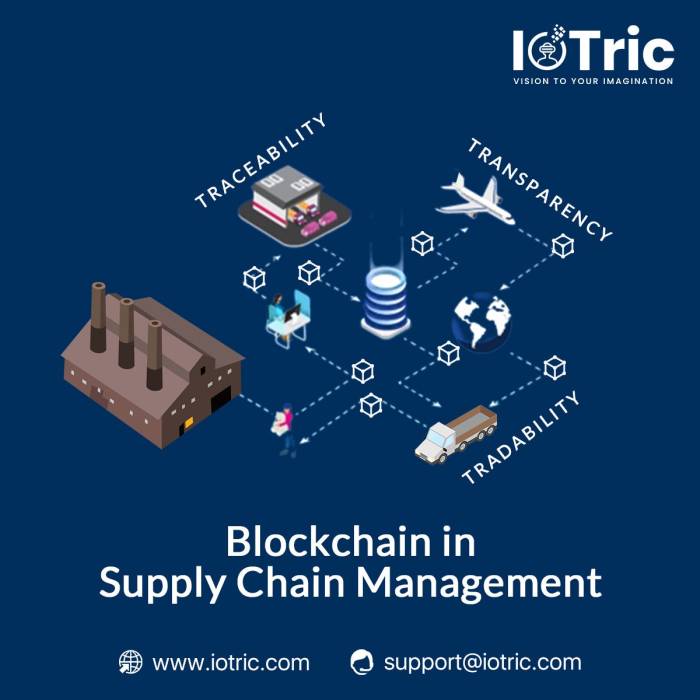Exploring the future potential of blockchain technology in supply chain management. – Exploring the future potential of blockchain technology in supply chain management, we find a transformative force poised to revolutionize how goods move and information flows. Imagine a world with completely transparent, secure, and efficient supply chains – that’s the promise of blockchain. This technology, with its decentralized and immutable ledger, offers solutions to long-standing challenges, from enhancing traceability and security to streamlining logistics and improving supplier relationships.
Let’s delve into how this groundbreaking technology is reshaping the future of global commerce.
Blockchain’s inherent security, enabled by cryptography, protects against data manipulation and fraud, building trust among all stakeholders. This increased transparency allows for better tracking of goods, ethical sourcing verification, and improved efficiency through automation. From reducing waste and optimizing inventory to speeding up payments and customs processes, the benefits are substantial and far-reaching. We’ll explore these advantages in detail, examining both the opportunities and the challenges involved in implementing blockchain within existing supply chain infrastructures.
Enhanced Traceability and Transparency: Exploring The Future Potential Of Blockchain Technology In Supply Chain Management.

Blockchain technology revolutionizes supply chain management by offering unprecedented levels of traceability and transparency. This enhanced visibility benefits all stakeholders, from producers to consumers, fostering trust and efficiency throughout the entire process. By recording immutable data on a shared, distributed ledger, blockchain creates a single source of truth, eliminating discrepancies and fostering accountability.Imagine a world where you can trace the journey of your coffee beans, from the farm in Colombia to your local cafe, with complete confidence in their origin and ethical sourcing.
This is the power of blockchain in supply chain management.
Impact of Blockchain on Tracking Goods
Blockchain’s impact on tracking goods is significant. It allows for the recording of crucial data points at each stage of the supply chain, creating a comprehensive and verifiable audit trail. This detailed record-keeping empowers businesses to identify inefficiencies, improve processes, and build stronger relationships with their suppliers and customers.
| Stage of Supply Chain | Data Recorded | Benefits of Blockchain Implementation | Potential Challenges |
|---|---|---|---|
| Raw Material Sourcing | Origin, date of harvest, quality certifications | Improved traceability of raw materials, reduced risk of fraud | Integration with existing legacy systems, data security |
| Manufacturing | Production date, location, batch number, quality control checks | Enhanced product quality control, faster identification of faulty batches | Maintaining data integrity across multiple manufacturing sites, cost of implementation |
| Distribution and Logistics | Shipment details, location tracking, temperature monitoring | Real-time visibility of goods in transit, reduced risk of theft or damage | Scalability of the blockchain network, interoperability with different logistics providers |
| Retail and Consumer | Product authenticity verification, purchase date, warranty information | Increased consumer trust, improved brand reputation, reduced counterfeiting | Consumer adoption of blockchain-based applications, user interface complexity |
Transparency for All Stakeholders
Blockchain’s transparency benefits all stakeholders. For example, in the food industry, consumers can verify the origin and handling of their food, building trust and promoting ethical sourcing. In the pharmaceutical industry, blockchain can track medications from manufacturing to dispensing, combating counterfeiting and ensuring product authenticity. The luxury goods industry benefits from blockchain’s ability to verify the authenticity of high-value items, reducing fraud and protecting brand reputation.
This enhanced transparency leads to increased accountability and efficiency across the board.
Enhanced Product Recall Efficiency
Consider a scenario where a food manufacturer discovers contamination in a specific batch of their product. With a traditional system, identifying and recalling all affected products is a time-consuming and costly process, often involving extensive manual tracking and communication with distributors and retailers. With blockchain, however, the manufacturer can instantly identify all affected products by querying the blockchain for the specific batch number.
This allows for a swift and targeted recall, minimizing disruption to the supply chain and significantly reducing costs associated with product waste, customer dissatisfaction, and legal repercussions. The speed and accuracy of blockchain-based recalls prevent widespread contamination and protect consumers.
Streamlined Logistics and Efficiency

Blockchain technology offers the potential to significantly streamline logistics and boost efficiency across the entire supply chain. By automating various processes and enhancing transparency, it promises faster delivery times, reduced costs, and improved overall operational effectiveness. This is achieved through features like smart contracts and immutable record-keeping, eliminating many of the bottlenecks and inefficiencies inherent in traditional supply chain systems.Blockchain’s impact on logistics is multifaceted, impacting everything from customs clearance to payment processing.
The inherent transparency and security of the blockchain create a more trustworthy and efficient environment for all parties involved.
Automated Customs Clearance and Payments
Automating customs clearance and payments is a major area where blockchain can make a significant difference. Currently, these processes are often slow, complex, and expensive, involving numerous intermediaries and paperwork. Blockchain can simplify this by creating a secure, shared platform where all relevant documentation is readily available and verifiable. Imagine a scenario where a shipment’s customs declaration is automatically generated and verified on the blockchain, eliminating the need for manual processing and reducing delays.
Similarly, smart contracts can automate payment releases upon successful customs clearance, ensuring timely payment to suppliers and reducing the risk of payment disputes. For example, a company like Maersk is already exploring the use of blockchain to streamline customs clearance processes, reporting significant reductions in processing time and associated costs. This automated system reduces paperwork, minimizes human error, and accelerates the overall shipping process.
Smart Contracts for Automating Supply Chain Agreements
Smart contracts, self-executing contracts with the terms of the agreement directly written into code, can revolutionize how supply chain agreements are managed. Let’s illustrate this with a step-by-step example:
- Agreement Creation: The supplier and buyer agree on the terms of a contract, including delivery dates, payment terms, and quality standards. This agreement is then encoded into a smart contract on the blockchain.
- Shipment Tracking: As the goods move through the supply chain, their location and status are recorded on the blockchain, providing real-time visibility for both parties.
- Automated Payment Release: Upon confirmation of delivery and quality checks (potentially through IoT sensors and automated inspections), the smart contract automatically triggers the payment to the supplier.
- Dispute Resolution: In the event of a dispute, the immutable record on the blockchain provides irrefutable evidence to facilitate faster and more efficient resolution.
This automated process eliminates the need for manual intervention and significantly reduces the risk of delays and disputes. The transparency provided by the blockchain ensures that both parties have a clear understanding of the agreement’s status at all times.
Improved Workflow in Logistics: A Flowchart
The following flowchart illustrates how blockchain can improve the workflow in logistics:[Imagine a flowchart here. The flowchart would begin with “Goods shipped,” proceed through “Customs clearance (automated via blockchain),” “Payment processed (automated via smart contract),” “Delivery confirmation (recorded on blockchain),” and finally, “Payment released (automatically).” Arrows would connect each stage, illustrating the streamlined process. The entire process would be contained within a box labeled “Blockchain-enabled Logistics Workflow.”] This visual representation demonstrates the seamless integration of various stages, leading to a more efficient and transparent supply chain.
The automation reduces manual steps, minimizes errors, and accelerates the overall process.
Increased Efficiency in Inventory Management

Blockchain technology offers a revolutionary approach to inventory management by providing real-time visibility and traceability throughout the entire supply chain. This enhanced transparency significantly improves efficiency, reduces waste, and ultimately boosts profitability. By leveraging the immutable nature of blockchain, businesses can gain a far more accurate and reliable understanding of their inventory levels than ever before.Real-time visibility into inventory levels is achieved through the recording of every movement and transaction of goods on a shared, distributed ledger.
This means that all stakeholders – from manufacturers to retailers – have access to the same, up-to-the-minute data. This eliminates discrepancies and delays caused by outdated or inaccurate information, leading to more informed decision-making.
Real-time Inventory Tracking and its Impact on Stockouts and Overstocking, Exploring the future potential of blockchain technology in supply chain management.
Real-time visibility directly addresses the costly problems of stockouts and overstocking. With accurate data on inventory levels at each stage of the supply chain, businesses can optimize their ordering and production processes. For example, if a retailer sees that inventory of a particular item is running low at a specific location, they can immediately place an order for replenishment, preventing stockouts and lost sales.
Conversely, if inventory levels are high, they can adjust their ordering to avoid overstocking, reducing storage costs and minimizing the risk of spoilage or obsolescence. This dynamic adjustment based on real-time data significantly improves efficiency and reduces waste, directly impacting the bottom line. The result is a more streamlined and responsive supply chain, better meeting consumer demand and reducing overall costs.
Blockchain’s Application in Managing Perishable Goods
The benefits of blockchain are particularly pronounced in the management of perishable goods, where timely and accurate tracking is crucial. Blockchain can facilitate real-time temperature monitoring throughout the supply chain, ensuring that perishable products are kept within their optimal temperature range. Smart contracts can be programmed to automatically trigger alerts if temperature deviations occur, allowing for immediate intervention to prevent spoilage.
For example, a shipment of fresh produce could be tracked from farm to store, with sensors recording temperature data at each stage. This data is recorded on the blockchain, providing an immutable audit trail that can be accessed by all parties involved. In the event of spoilage, the blockchain data can be used to identify the point of failure and implement corrective measures.
This level of traceability and transparency significantly reduces waste and improves food safety, benefiting both businesses and consumers. Moreover, consumers can use blockchain-based applications to verify the origin and handling conditions of the products they purchase, increasing trust and confidence.
Strengthening Supplier Relationships

Blockchain technology revolutionizes supply chain relationships by fostering unprecedented trust and collaboration among partners. Its inherent transparency and immutability create a shared, verifiable record of transactions and interactions, reducing the need for intermediaries and fostering a more equitable and efficient ecosystem. This shared understanding builds stronger, more reliable relationships based on mutual accountability and improved communication.By providing a single source of truth, blockchain eliminates discrepancies and disputes that often arise from conflicting data.
This shared visibility promotes proactive problem-solving and strengthens the bond between suppliers, manufacturers, distributors, and retailers. Everyone involved has access to the same information, leading to improved coordination and more effective responses to challenges.
Improved Communication and Data Sharing
A shared blockchain ledger acts as a central repository for all relevant supply chain data. This includes everything from raw material sourcing and manufacturing processes to product delivery and end-user feedback. Suppliers can securely share information about their production capabilities, inventory levels, and quality control measures with manufacturers, distributors, and retailers. Conversely, manufacturers and retailers can share sales data and consumer preferences with suppliers, enabling them to optimize production and meet demand more effectively.
For instance, a textile manufacturer can use a blockchain system to share real-time data on fabric production, allowing retailers to accurately predict inventory needs and avoid stockouts. Similarly, a coffee producer can provide detailed information on bean origin, processing methods, and sustainability practices, giving consumers greater transparency and building trust in the brand.
Blockchain-Based Supplier Performance Management System
A blockchain-based system can efficiently manage supplier performance using a range of pre-defined metrics and automated reporting mechanisms. This system would track key performance indicators (KPIs) such as on-time delivery, product quality, adherence to ethical sourcing standards, and environmental impact. Smart contracts, self-executing agreements with the terms of the agreement between buyer and seller directly written into lines of code, can automatically trigger payments upon fulfillment of agreed-upon criteria.
Conversely, penalties for non-compliance can also be automatically enforced. Regular reports generated by the system would provide a clear and transparent view of each supplier’s performance, allowing for objective evaluation and informed decision-making.For example, a system might track a supplier’s on-time delivery rate over a period of time. If the rate falls below a pre-determined threshold, the system might automatically issue a warning to the supplier.
Continued underperformance could trigger penalties, such as reduced payments or contract termination, all documented on the immutable blockchain ledger. This automated system eliminates bias and ensures consistent and fair evaluation of all suppliers. The system would also track sustainability metrics, such as carbon emissions, water usage, and waste generation, providing incentives for suppliers to adopt environmentally friendly practices. These data points could be used to rank suppliers based on their sustainability performance, influencing purchasing decisions and promoting responsible sourcing.
Addressing Sustainability and Ethical Concerns

Blockchain’s immutable ledger offers a powerful tool for enhancing transparency and accountability across supply chains, directly addressing growing concerns about sustainability and ethical sourcing. Its ability to track products from origin to consumer provides a level of traceability previously unattainable, enabling businesses to verify claims of ethical and sustainable practices and build trust with consumers. This enhanced transparency also allows for more effective monitoring and mitigation of environmental and social risks.Blockchain technology can revolutionize how we track the ethical sourcing of materials and products, providing irrefutable evidence of responsible practices throughout the supply chain.
This transparency fosters trust with consumers who are increasingly demanding ethically sourced goods. The ability to verify claims and identify potential issues early allows for swift corrective action.
Tracking Ethical Sourcing of Materials and Products
The inherent transparency of blockchain allows for detailed tracking of materials and products, verifying their origin and the conditions under which they were produced. This is crucial for ensuring compliance with ethical standards and regulations.
- Verification of Fair Labor Practices: Blockchain can record worker wages, working conditions, and compliance with labor laws at each stage of production, ensuring fair treatment of workers throughout the supply chain.
- Confirmation of Sustainable Harvesting: Tracking the origin of raw materials, such as timber or minerals, can verify that they were harvested sustainably and legally, preventing illegal logging or mining.
- Authentication of Certifications: Blockchain can securely store and verify certifications related to ethical sourcing, such as Fair Trade or organic certifications, preventing counterfeiting and ensuring authenticity.
- Traceability of Conflict Minerals: The technology can track the movement of minerals from mine to manufacturer, helping to prevent the use of conflict minerals sourced from war zones.
Improving Transparency in Environmental Impact Reporting
Accurate and transparent reporting of environmental impact is crucial for sustainability. Blockchain can facilitate this by providing a secure and auditable record of environmental data throughout the supply chain.
- Carbon Footprint Tracking: Emissions at each stage of production, transportation, and distribution can be recorded on the blockchain, providing a comprehensive view of the product’s overall carbon footprint.
- Waste Management Monitoring: The amount and type of waste generated at each stage can be tracked, enabling companies to identify areas for improvement in waste reduction and recycling.
- Water Usage Tracking: Water consumption can be monitored and reported, helping to ensure responsible water management practices.
- Energy Consumption Tracking: Energy use at each stage can be recorded, allowing companies to identify opportunities for energy efficiency improvements.
Blockchain in Sustainable Fair Trade Coffee Production
Imagine a coffee cooperative in a developing country. Traditionally, tracking their beans through the complex supply chain to the consumer was challenging, making it difficult to guarantee fair prices and working conditions for farmers. Using blockchain, every step – from planting and harvesting to roasting and distribution – can be recorded. This includes details about the farmer, the farm’s location, the harvesting date, the processing methods, and even the carbon footprint of transportation.
Consumers can then scan a QR code on the coffee bag and trace the entire journey, verifying that they are buying ethically sourced, sustainable coffee. This transparency empowers both farmers, who receive fair compensation, and consumers, who can make informed purchasing decisions based on ethical considerations. This increased transparency leads to greater consumer trust and demand for ethically sourced products, creating a positive feedback loop for sustainable practices.
In conclusion, the integration of blockchain technology into supply chain management presents a compelling vision for a more transparent, secure, and efficient future. While challenges related to scalability and regulation exist, the potential benefits – improved traceability, enhanced security, streamlined logistics, and stronger supplier relationships – are too significant to ignore. As blockchain technology matures and adoption increases, we can expect to see a dramatic shift towards a more resilient, sustainable, and trustworthy global supply chain ecosystem.
The journey is underway, and the future looks bright for those embracing this transformative technology.